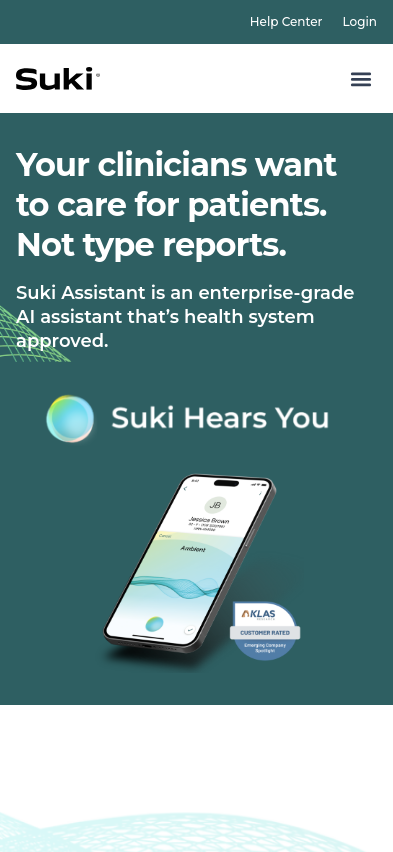⚡ZurzAI.com⚡
AI Start Ups Your Should Know
Suki.AI

Suki.AI offers an AI-powered voice assistant for doctors, focusing on geriatric medicine.
News | About | News | About | About | About | About | About | About | About | About | About | About | About | About | Locations | About | About | About | About | News | About | About
Suki AI is focused on reducing the administrative burden of documentation in healthcare through its AI-driven solutions, notably the Suki Assistant. The Suki Assistant is designed as an enterprise-grade AI tool aimed at enhancing the efficiency of health systems by aiding clinicians, allowing them to prioritize patient care. Here is an overview of Suki’s offerings and integrations:
Key Features of Suki Assistant:
- Ambient Documentation: Suki generates notes passively, cutting down the time clinicians spend on typing reports. It can also perform dictation and recommend coding, such as ICD-10 and HCC codes.
- AI Capabilities: The assistant can answer questions and perform tasks across various platforms including iOS, Android, and desktop.
- Integration with EHRs: Suki boasts deep bidirectional integration with major Electronic Health Records (EHR) systems like Athena, Cerner, Epic, and Meditech. This allows for real-time data synchronization and seamless incorporation into clinicians' workflows, negating the need for manual data entry.
Technology and Security:
- Advanced AI Technology: Suki uses technologies such as Automatic Speech Recognition (ASR), Natural Language Understanding (NLU), and Natural Language Processing (NLP) to improve documentation accuracy and efficiency.
- Data Security: Suki ensures compliance with regulations like HIPAA and is SOC2 Type2 certified, meaning it employs rigorous security measures to protect patient data.
Benefits and ROI:
- Time and Cost Efficiency: The assistant reportedly reduces documentation time by about 72%, enabling clinicians to see more patients and improve service quality. Clients typically experience a positive return on investment by the second month of use, primarily through improved documentation quality and reduced burnout among physicians.
- Adaptability Across Specialties: It supports 99+ medical specialties and offers multilingual capabilities, making it versatile for diverse healthcare settings like ambulatory care, inpatient care, telehealth, and home health.
Integration and Deployment:
- Ease of Integration: Suki provides cloud-based solutions and leverages API-based EHR integrations, reducing the overhead for IT departments. Its modularized architecture enhances scalability and ensures that the software can handle large volumes of users effortlessly.
- Minimal Required Infrastructure: Suki can be deployed on existing devices and networks, requiring no additional hardware investments.
Market Position and Collaborations:
- Partnerships: Suki partners with EHR providers and other healthcare technology platforms, offering ambient documentation tools, AI-driven voice interactions, and dictation capabilities that are seamlessly embedded in existing systems.
- Recognition and Awards: The company has been recognized with awards for its innovation and contributions to healthcare technology.
Vision and Mission:
- Reducing Clinician Burnout: By minimizing the administrative workload, Suki aims to combat clinician burnout, allowing healthcare providers to focus more on patient care. The leadership team commits to creating AI solutions that are assistive and integrative with existing healthcare technology.
- Future Outlook: Suki envisions AI evolving into an assistive layer across healthcare infrastructures, employing speech and language processing technologies to enhance service delivery.
Suki continues to engage with healthcare organizations, providing solutions aimed at improving the clinician experience and patient outcomes through AI-powered technologies. The company frequently participates in industry events to showcase its technology and gather insights for continuous improvement.